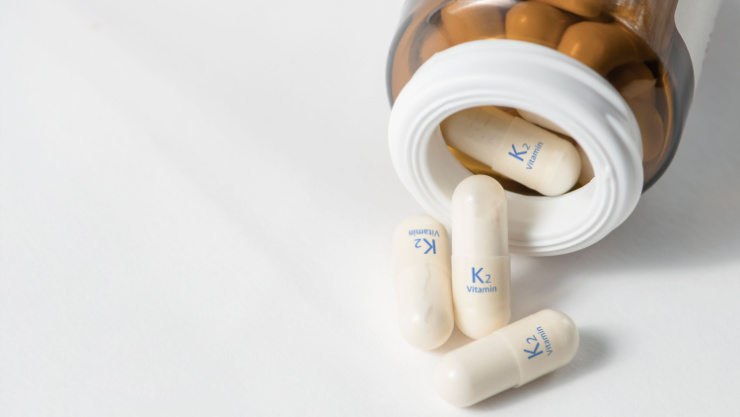At Mercola.com, Dr. Joseph Mercola discusses the importance of vitamin K2 intake regarding vitamin D and the prevention of calcification. He writes:
Vitamin K is a fat-soluble vitamin that is well-known for its role in blood clotting. However, there are two different kinds of vitamin K,1 each providing its own set of health benefits. Vitamin K1 is primarily responsible for blood clotting whereas vitamin K2 works synergistically with calcium, magnesium and vitamin D to impart a number of important health benefits, including but not limited to:2
Preventing osteoporosis3 Preventing hardening of the arteries (atherosclerosis)4 and lowering your heart attack risk5 Directing calcium to your bones, making them stronger, and your teeth to help prevent cavities. It also prevents calcium from going to the wrong areas, such as to your kidneys, where it could lead to kidney stones, or your blood vessels, where it could trigger heart disease
Creating insulin to stabilize your blood sugar (keeping your system sensitive to maintaining correct amounts), thereby protecting against diabetes and helping to prevent metabolic problems associated with obesity Optimizing sexual function by increasing testosterone and fertility in men Decreasing androgens, the male hormones, in women with polycystic ovarian syndrome Suppressing genes that can promote cancer while strengthening genes that promote healthy cells. The 2010 European Prospective Investigation into Cancer and Nutrition (EPIC) study6 found that high intake of vitamin K2 — not K1 — leads to reduced cancer risk, as well as a 30% lower risk of dying from cancer7
Enhancing your ability to utilize energy as you exercise improving overall performance.
Serving as a mitochondrial electron carrier, vitamin K2 also helps maintain normal ATP production in mitochondrial dysfunction, such as that found in Parkinson’s disease8
Protecting against neurological deficiencies, including dementia Prevent infectious diseases such as pneumonia Improving disease activity in those with rheumatoid arthritis,9 and, in combination with vitamin D, improving osteoarthritis of the knee10,11 Reducing the risk of osteoporosis and spontaneous fractures in adults with cerebral palsy12 Supporting healthy immune function Supporting growth and development of the fetus during pregnancy Higher Vitamin K2 Intake Associated With Improved Heart Health
In the video above, Kate Rheaume-Bleue, a naturopathic physician and author of “Vitamin K2 and the Calcium Paradox” discusses the importance of this often-overlooked vitamin, and its synergistic effects with other nutrients. Vitamin K2 deficiency is actually what produces the symptoms of vitamin D toxicity, which includes inappropriate calcification of soft tissues that can lead to atherosclerosis.
An article in Life Extension Magazine13 also highlights the cardiovascular benefits of vitamin K2. Importantly, a double-blind, placebo-controlled study14 published in 2015 found that taking 180 micrograms (mcg) per day of vitamin K2 (MK-7 form) for three years improved arterial stiffness in postmenopausal women, especially those who had a high degree of arterial stiffness.
At the end of the study, the treatment group had a 5.8% lower stiffness index beta (a parameter of arterial stiffness) and a 3.6% lower carotid-femoral pulse wave velocity (a test that measures arterial stiffness). The placebo group, on the other hand, saw a 1.3% and 0.22% increase in these measurements respectively.
This study has been lauded as significant because while previous studies have only been able to show an association, this is the first to confirm that long-term use of vitamin K2 in the form of MK-7 does improve cardiovascular health. Prior to this study, it was unclear whether taking additional vitamin K2 could actually reverse calcification of the arteries that had already occurred. As noted in Life Extension:15
“This is the first long-term human trial showing improvements in measures of arterial stiffness in response to long-acting vitamin K2.
While the 5.8% and 3.6% improvements might not appear substantial, when realizing that calcification often worsens with age, the fact that there was a reversal in arterial stiffness compared to placebo is quite remarkable … This provides us all with an opportunity to restore more youthful flexibility to aging blood vessels and other soft tissues.”
Other Studies Also Confirm Vitamin K2 Helps Reduce Cardiovascular Events and Lowers Mortality
Other previous studies have also clearly demonstrated vitamin K2’s importance for heart health and longevity. In the Rotterdam Study,16 which ran for 10 years, those who consumed the greatest amounts of K2 had the lowest risk of cardiovascular disease and cardiovascular calcification, and the lowest chance of dying from cardiovascular disease.
People who consumed 45 mcg of K2 daily lived seven years longer than people getting 12 mcg per day. This was a profound discovery because such a correlation did not exist for K1 intake. In a subsequent trial called the Prospect Study,17,18 16,000 people were followed for 10 years. Here, they found that each additional 10 mcg of K2 in the diet resulted in 9% fewer cardiac events.
Read more here.
If you’re willing to fight for Main Street America, click here to sign up for my free weekly email.






